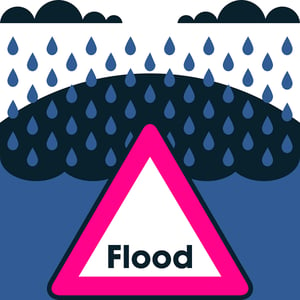How is climate change affecting the UK?
The UK not only became the first country to declare a ‘climate emergency’ last year, but also the first major economy to pass laws to end its contribution to global warming by 2050, bringing all greenhouse gas emissions to net zero.
It’s widely understood why such action is necessary, in order to prevent further disastrous consequences of climate change.
But what about the UK itself: just how much of an impact is climate change having here and now?
It’s getting warmer
According to the Met Office, all of the UK's ten warmest years on record have occurred since 2002. And, by 2050, heatwaves like the one seen in 2019 are expected every other year.
Whilst some extra warm weather may seem welcome, longer hot and dry periods, leading to droughts, put extra pressure on UK water supplies. This will get worse, but the head of the Environment Agency is already calling for people in England to cut their water use from an average of 140 litres of water a day now to 100 litres.
The heat also poses a risk to people’s health, particularly young children and older people. The summer heatwaves of 2019 resulted in almost 900 extra deaths, according to Public Health England.
The hot weather can also place strains on transport infrastructure. In 2006, the cost of repairs for heat damage to road surfaces was estimated at £3.6m in Oxfordshire alone.
Meanwhile, rail passengers are left bemoaning delays, cancellations and speed restrictions caused by warped tracks.

It’s getting wetter
Rising sea levels, more severe storms and heavier rainfall - since 1998, the UK has seen seven of the ten wettest years on record - mean a higher risk of flooding.
In fact, last year, there were over 5,600 flood warnings in England, which is more than in any of the last 15 years, except 2012.
According to the Environment Agency, there are 240,000 homes and existing properties currently in high flood risk areas.
Events of recent years have shown just how damaging flooding can be, from damage to homes and possessions, to death and injury. It exerts a tough economic toll too; flood damage costs the UK around £1.3 billion each year.
Food and farming
Farming is acutely vulnerable to the impacts of climate change, with temperature changes and the potential reduced availability of water, due to droughts, affecting growing conditions for crops and livestock.
This is already happening. For example, recent heatwaves have led to low yields of most UK crops, such as cereals, carrots and potatoes. The unpredictable weather also makes it harder for farmers to plan the growing season.
Among the many other impacts, new diseases may hit livestock or crops; the recent appearance of Bluetongue disease in sheep in northern Europe is thought to be possibly because of temperature-driven shifts in the range of disease-carrying midges.
UK consumers are also at the mercy of the impacts of climate change on agriculture across the globe, as the UK imports 40% of the food it consumes.
Among small blessings, warmer temperatures mean crops such as oranges and grapes can be grown in the UK, reducing the environmental impact caused by importing them.

Wildlife suffers
It's not just humans who are affected by climate change, but the UK’s wildlife too. You may have seen, for example, flowers such as snowdrops are blooming earlier in the spring.
Rising temperatures change animals’ habits and habitats. Migrating birds may have to change their migration routes or the places where they breed or spend winter.
Flooding is dangerous for almost all mammals, as the young may drown or die from the cold.
Wetland birds are adversely affected by rising sea levels. The list goes on.
Some of these changes may not seem significant alone, but as the Soil Association points out, climate change creates a chain reaction that echoes through every level of an ecosystem.
Although the impacts of climate change are clearly already being felt in the UK, other countries are faring much worse. The UK was ranked at number 78 in the 2018 Climate Risk Index, which ranks countries according to the impact of extreme weather events; their economic effects and the number of deaths they cause.
But, thankfully, in the UK and elsewhere, there is still time to make a difference. One of the easiest ways you can start being part of the solution rather than the problem is by improving your energy efficiency. Improved energy usage means reduced costs and a smaller impact on the environment as you’ll be using less energy from non-renewable sources. Take your first step with Loop.
• • •
With Loop, you can find out how you use electricity, then make smart decisions about using less - click here to find out more. We have a risk-free, no-quibble, money-back guarantee as standard, so what's to lose...apart from some £££ from your bills and some weight from your carbon footprint?







